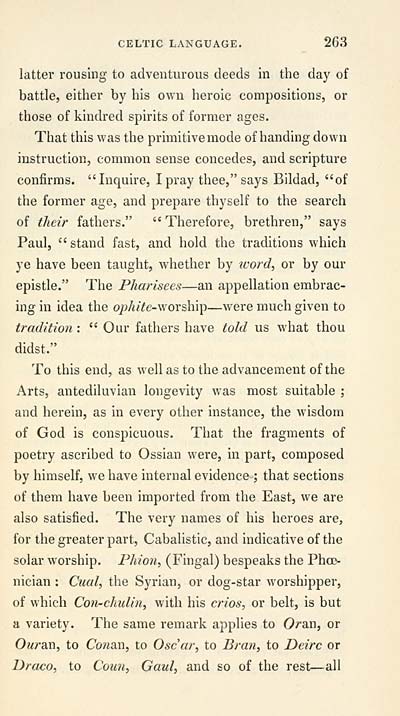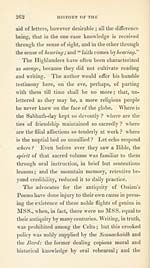Download files
Complete book:
Individual page:
Thumbnail gallery: Grid view | List view

CELTIC LANGUAGE. 263
latter rousing to adventurous deeds in the day of
battle, either by his own heroic compositions, or
those of kindred spirits of former ages.
That this was the primitive mode of handing down
instruction, common sense concedes, and scripture
confirms. "Inquire, I pray thee," says Bildad, "of
the former age, and prepare thyself to the search
of their fathers." " Therefore, brethren," says
Paul, " stand fast, and hold the traditions which
ye have been taught, whether by icord., or by our
epistle." The Pharisees — an appellation embrac-
ing in idea the o/?/i/^e-worship — were much given to
tradition : "Our fathers have told us what thou
didst."
To this end, as well as to the advancement of the
Arts, antediluvian longevity was most suitable ;
and herein, as in every other instance, the wisdom
of God is conspicuous. That the fragments of
poetry ascribed to Ossian were, in part, composed
by himself, we have internal evidence ; that sections
of them have been imported from the East, we are
also satisfied. The very names of his heroes are,
for the greater part, Cabalistic, and indicative of the
solar worship. Phion^ (Fingal) bespeaks the Phoe-
nician : Cual, the Syrian, or dog-star Avorshipper,
of which Con-chulin, with his crios, or belt, is but
a variety. The same remark applies to Oran, or
Owran, to Co^ian, to Oscar, to Bran, to Deirc or
Draco, to Coun, Gaul, and so of the rest — all
latter rousing to adventurous deeds in the day of
battle, either by his own heroic compositions, or
those of kindred spirits of former ages.
That this was the primitive mode of handing down
instruction, common sense concedes, and scripture
confirms. "Inquire, I pray thee," says Bildad, "of
the former age, and prepare thyself to the search
of their fathers." " Therefore, brethren," says
Paul, " stand fast, and hold the traditions which
ye have been taught, whether by icord., or by our
epistle." The Pharisees — an appellation embrac-
ing in idea the o/?/i/^e-worship — were much given to
tradition : "Our fathers have told us what thou
didst."
To this end, as well as to the advancement of the
Arts, antediluvian longevity was most suitable ;
and herein, as in every other instance, the wisdom
of God is conspicuous. That the fragments of
poetry ascribed to Ossian were, in part, composed
by himself, we have internal evidence ; that sections
of them have been imported from the East, we are
also satisfied. The very names of his heroes are,
for the greater part, Cabalistic, and indicative of the
solar worship. Phion^ (Fingal) bespeaks the Phoe-
nician : Cual, the Syrian, or dog-star Avorshipper,
of which Con-chulin, with his crios, or belt, is but
a variety. The same remark applies to Oran, or
Owran, to Co^ian, to Oscar, to Bran, to Deirc or
Draco, to Coun, Gaul, and so of the rest — all
Set display mode to: Large image | Transcription
Images and transcriptions on this page, including medium image downloads, may be used under the Creative Commons Attribution 4.0 International Licence unless otherwise stated. ![]()
| Early Gaelic Book Collections > Blair Collection > History of the Celtic language > (269) |
|---|
| Permanent URL | https://digital.nls.uk/76181568 |
|---|
| Description | A selection of books from a collection of more than 500 titles, mostly on religious and literary topics. Also includes some material dealing with other Celtic languages and societies. Collection created towards the end of the 19th century by Lady Evelyn Stewart Murray. |
|---|
| Description | Selected items from five 'Special and Named Printed Collections'. Includes books in Gaelic and other Celtic languages, works about the Gaels, their languages, literature, culture and history. |
|---|

